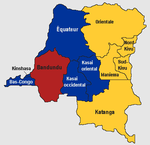Congo electoral commissioner condemns Kinshasha clashes
Saturday, August 26, 2006
Nearly a week after the announcement of provisional election results in the Democratic Republic of Congo sparked violence across the capital Kinshasa, the country's Electoral Commissioner has spoken out to halt clashes.
In an interview with journalists associated with the UN mission in Congo, Independent Electoral Commission President, Fr Malu Malu called for an end to gun battles between forces loyal to two presidential candidates.
"It cannot be accepted, and any Congolese in his or her right mind could not consider that what happened was normal," he said, "The country and the Congolese people have expressed their will in the clearest possible way, and their choice needs to be accepted."
Mr. Malu Malu also added that if calm returned to Kinshasha this weekend, his commission would slowly begin to announce other election results, but added that security was essential for this to happen. "All of us - the organisers of the elections, the voters, candidates, observers, and our friends who support the electoral process - all of us have a need for security, and we will not tolerate insecurity. I believe security is an issue of shared responsibility which is demanded of all of us" he said.
Meanwhile, the incumbent government has been counting the cost of this week's violence. It is now believed around 43 people have been killed in clashes since Sunday, with many bodies still lying in the streets. The dead include 12 policemen and 4 civilians.
Violence began after provisional results were announced for July’s landmark elections last Sunday, and several gunfights took place across the capital.
Violence broke out around the house of one of the main presidential contenders, Jean-Pierre Bemba on Monday. As Bemba was meeting with U.N. officials and ambassadors, troops loyal to the incumbent president, Joseph Kabila, opened fire around Bemba’s villa, forcing 14 ambassadors to flee for cover.
UN troops soon took over control in the city, but sporadic clashes continued through Tuesday. The streets have become deserted according to journalists in Kinshasa.
A fragile truce was declared on Tuesday as both Kabila and Bemba agreed to withdraw their forces from the city. The largest UN peacekeeping force in the world is currently trying to maintain the peace, which analysts fear may not last.
"The situation is still very tense," one diplomat told Reuters, "there are too many nervous men wandering around with guns, but we have moved on from the clashes earlier this week."
Electoral divide
edit
Hopes were high that elections in the Democratic Republic – the first since 1961 – would mark a new start for the massive country. The initial results, however, revealed marked divisions among the population.
The current president, Joseph Kabila, holds the lead with 44.81% of the vote, more than twice the general support of Bemba. Kabila's support though comes solely from the eastern provinces in the country. In western Kinshasha, Kabila holds just 13% of the vote, and in the west and north of the country his strength is minimal.
A presidential run-off between Kabila and Bemba is set for the 29th October.
Related news
edit- "Violence in Congo after first round election results are announced" — Wikinews, August 22, 2006
- "Campaigning ends in landmark Congo elections" — Wikinews, July 29, 2006
- "Campaigning begins for groundbreaking Congo elections" — Wikinews, June 20, 2006
Sources
edit- IRIN. "Counting the casualties after Kinshasha battle" — MONUC, August 26 2006
- Oscar Mercado & Eoin Young. "IEC: Everyone must respect the democratic process, so that we can organise the forthcoming elections" — MONUC, August 25 2006
- "Death toll rises in Congo clash" — BBC News Online, August 24 2006
- Daniel Flynn, David Lewis. "Foreign troops pledge to police fragile Congo truce" — Reuters South Africa, August 24 2006
- Said Penda. "Looting and anger in Congo capital" — BBC News Online, August 23 2006
- "Gunfight pins down envoys in Congo capital" — Yahoo News, August 21 2006
| This page has been automatically archived by a robot, and is no longer publicly editable.
Got a correction? Add the template {{editprotected}} to the talk page along with your corrections, and it will be brought to the attention of the administrators. Please note that the listed sources may no longer be available online. |